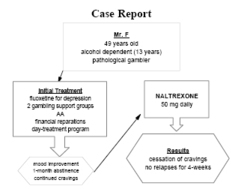If pathological gambling shares certain characteristics, such as impulsiveness, with other addictive disorders, it is reasonable to hypothesize that treatments for other adddictive disorders may benefit individuals who suffer from pathological gambling. Naltrexone, an opioid antagonist, has been shown to be effective in treating alcohol dependence. Very little research has been conducted in the pharmacological treatment of pathological gamblers. No clinical trials have examined the treatment effect of naltrexone in reducing the cravings or the frequency of pathological gambling behavior. However, Crockford & el-Guebaly recently published a case report of a successful outcome from treating a pathological gambler with naltrexone [1]. The patient, a 49-year old man, was a pathological gambler (met DSM-IV criteria and scored 12 on the SOGS) and had a 13-year history of alcohol dependence (DSM-IV criteria). Nine months prior to seeking help, he had become heavily involved in gambling, primarily video lottery terminals, which led him to the brink of bankruptcy. Non-pharmacological treatment such as gambling support groups, AA, financial reparations, and a day-treatment program seemed to improve his mood and enable him to abstain from both gambling and alcohol for one month. However, he continued to report strong cravings for both gambling and drinking. At this point he began a trial of naltrexone (50 mg daily). Within 48 hours he reported no cravings, and had significantly reduced scores on two scales measuring compulsive drinking and compulsive gambling. He maintained this state over the next four weeks with no relapses. The physician researchers speculate that the endogenous opioid system acts as a common pathway in regulating cravings. Although naltrexone appears to have been an effective treatment for this individual, a case report cannot provide information about the broad effect of this medication on a group of individuals. The National Center for Responsible Gaming has awarded Dr. Suck Won Kim at the University of Minnesota Medical School a grant to conduct a double-blind randomized naltrexone and placebo study for the treatment of pathological gambling (2). This study will evaluate the efficacy and safety of naltrexone in the treatment of pathological gambling. Thirty pathological gamblers will be enrolled in a one-week single-blind placebo lead-in treatment period followed by a twelve-week double-blind naltrexone or placebo treatment. This research will provide clinicians with more information to make decisions about treating their patients with pathological gambling disorders with naltrexone. This study may also provide information about whether pathological gamblers without alcohol dependence will benefit from naltrexone as much as patients with both alcohol dependence and disordered gambling.
Sources:
1. Crockford, D.N., el-Guebaly, N. (1998). Naltrexone in the treatment of pathological gambling and alcohol dependence [letter]. Canadian Journal of Psychiatry, 43(1), 86
2. See the National Center for Responsible Gaming’s website at: http://www.ncrg.org/
This public education project is funded, in part, by The Andrews Foundation.
This fax may be copied without permission. Please cite The WAGER as the source.
For more information contact the Massachusetts Council on Compulsive Gambling,
190 High Street, Suite 6, Boston, MA 02110, U.S.





